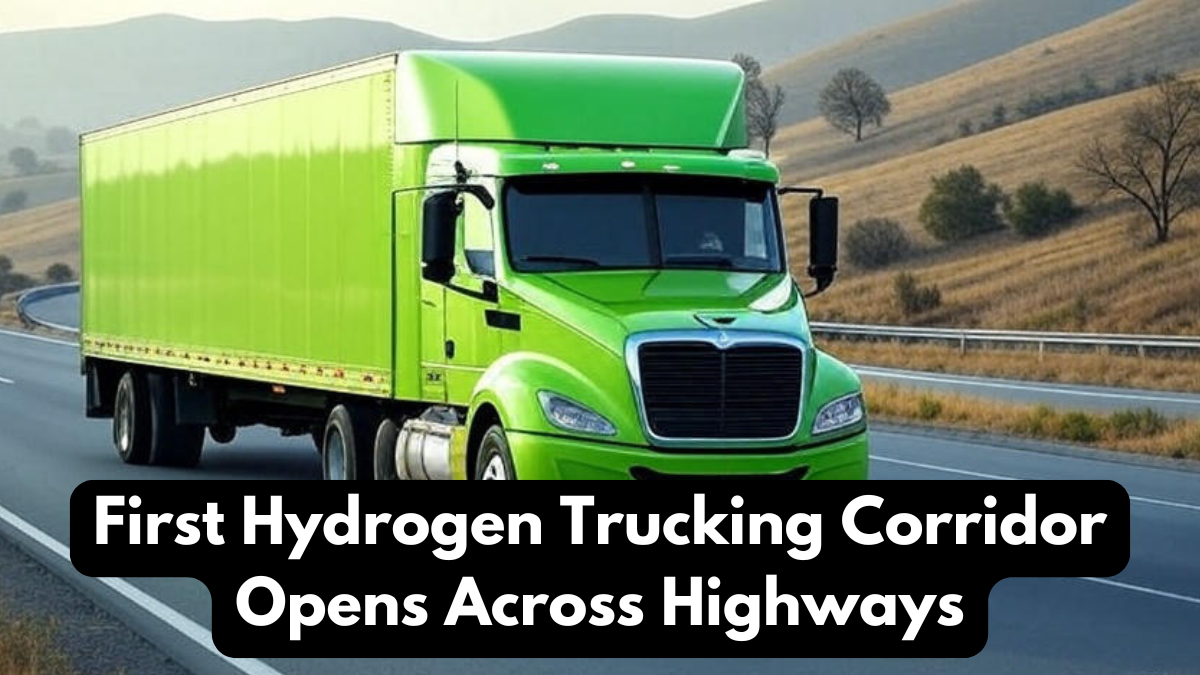The launch of the Hydrogen Trucking Corridor marks a transformative step for global transportation. As industries search for sustainable freight solutions, hydrogen-powered trucking emerges as a reliable alternative to diesel. This initiative is not just about innovation; it’s about reshaping supply chains with Green Logistics practices that prioritize clean energy and environmental responsibility. By creating dedicated highway corridors, the project sets the stage for a new era of freight mobility.

What is a Hydrogen Trucking Corridor?
A Hydrogen Trucking Corridor is a designated highway route equipped with fueling infrastructure for hydrogen-powered trucks. These corridors allow long-haul carriers to transition from fossil fuels to clean hydrogen energy without the worry of limited refueling options.
The corridor features:
- Dedicated hydrogen refueling stations at key intervals
- Support facilities for vehicle maintenance and safety checks
- Partnerships with logistics companies adopting hydrogen fleets
- Real-time monitoring systems to optimize truck operations
This design ensures both efficiency and reliability, making hydrogen trucking practical for commercial use.
Hydrogen Trucks and the Push for Green Logistics
The introduction of the Hydrogen Trucking Corridor aligns directly with the rise of Green Logistics, where the focus is on reducing emissions, optimizing resources, and improving sustainability in supply chains. Hydrogen-powered trucks have several advantages over traditional diesel:
- Zero tailpipe emissions
- Faster refueling times compared to battery-electric trucks
- Extended driving ranges suitable for long-haul routes
- Reduced noise pollution in urban and rural areas
By integrating these vehicles into freight networks, logistics companies can meet stricter emission regulations while cutting fuel costs over time.
Comparing Diesel, Electric, and Hydrogen Trucks
To highlight the importance of hydrogen trucking, here’s a comparison of three major freight options:
| Feature | Diesel Trucks | Electric Trucks | Hydrogen Trucks |
|---|---|---|---|
| Fuel Source | Fossil fuels | Batteries (electricity) | Hydrogen fuel cells |
| Emissions | High CO₂ and NOx | Zero at tailpipe | Zero at tailpipe |
| Refueling/Charging Time | 5–10 minutes | Several hours | 10–15 minutes |
| Driving Range | Long (1,000+ km) | Short to medium (200–400 km) | Long (700–1,000 km) |
| Suitability | Established global network | Best for urban deliveries | Ideal for long-haul trucking |
This comparison shows that while diesel still dominates today, hydrogen trucks supported by a Hydrogen Trucking Corridor are the most balanced option for the future of Green Logistics.
Economic and Environmental Benefits
The rollout of the Hydrogen Trucking Corridor brings a wave of economic and environmental advantages. Logistics companies benefit from reduced fuel costs in the long term, while countries gain energy security by cutting reliance on imported oil.
From an environmental perspective, the corridor reduces greenhouse gas emissions significantly. Each hydrogen-powered truck replacing a diesel truck can cut CO₂ emissions by up to 80 tons annually. By expanding corridors across highways, the overall impact on air quality and climate goals is profound.
Challenges and the Road Ahead
Despite its promise, the Hydrogen Trucking Corridor faces challenges. The high cost of hydrogen production and the limited availability of green hydrogen remain hurdles. Building refueling stations also requires significant investment. However, as governments push for carbon neutrality and private companies invest in hydrogen infrastructure, these challenges are gradually being overcome.
International collaboration is expected to accelerate development. With Green Logistics now a top priority, partnerships among automotive companies, energy providers, and governments will expand corridors across borders, ensuring hydrogen trucking is not limited to single regions but becomes a global reality.
Conclusion
The launch of the Hydrogen Trucking Corridor signals the future of freight transport. By aligning with Green Logistics, this initiative ensures supply chains remain sustainable, efficient, and environmentally responsible. Hydrogen-powered trucks are not just an alternative—they are the next frontier in logistics. As more corridors open worldwide, trucking will play a vital role in achieving cleaner, greener highways for generations to come.
FAQs
What is the Hydrogen Trucking Corridor?
The Hydrogen Trucking Corridor is a highway route with dedicated hydrogen refueling stations designed for hydrogen-powered trucks.
How does it support Green Logistics?
By enabling hydrogen trucking, the corridor reduces emissions, supports sustainable supply chains, and promotes eco-friendly freight transport.
Are hydrogen trucks better than electric trucks?
Yes, for long-haul operations. Hydrogen trucks offer longer ranges and faster refueling compared to battery-electric trucks, making them ideal for highways.
What are the main challenges of hydrogen trucking?
The main challenges include the high cost of hydrogen fuel, limited refueling infrastructure, and the need for scaling up green hydrogen production.
Click here to learn more